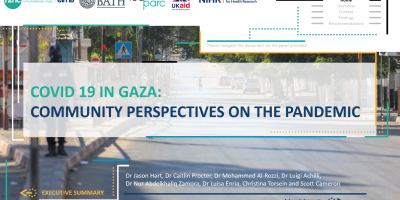The Palestinian authority (PA) reacted quickly to the coronavirus outbreak, introducing strict lock down measures to limit community transmission. However, since restriction measures were eased in late May, there has been a massive spike in cases with over 9000 cases by July 18 2020 compared with less than 400 cases at the end of the lockdown. This has created a climate of fear. Since the spike, shorter lockdown measures have been instituted, but have been met with protests due to the lack of economic protection for the population. Going forward, long-term lockdown measures are likely unable to be implemented in the occupied Palestinian territory (oPt) as the financial and social consequences have had devastating impacts on the nation as a whole.
Summary box
-
Israeli military occupation of the Palestinian territory has resulted in stunted development, weak and underfunded health and social services.
-
The structural predicament in the occupied Palestinian territory (oPt) has exacerbated political, economic and social instability during the COVID-19 outbreak.
-
The current situation cannot be detached from the broader context of settler colonialism and the logic of colonisation.
-
Several groups are acutely disadvantaged and marginalised by the COVID-19 restrictions, including women and young people.
-
Mental health is often overlooked in this context and psychosocial support is often unavailable.
-
The lack of long-term development exacerbates the current situation and questions the role of humanitarian and development aid.
-
By questioning responsibility, the COVID-19 pandemic in the oPt may represent an opportunity for justice and freedom for Palestinians.



